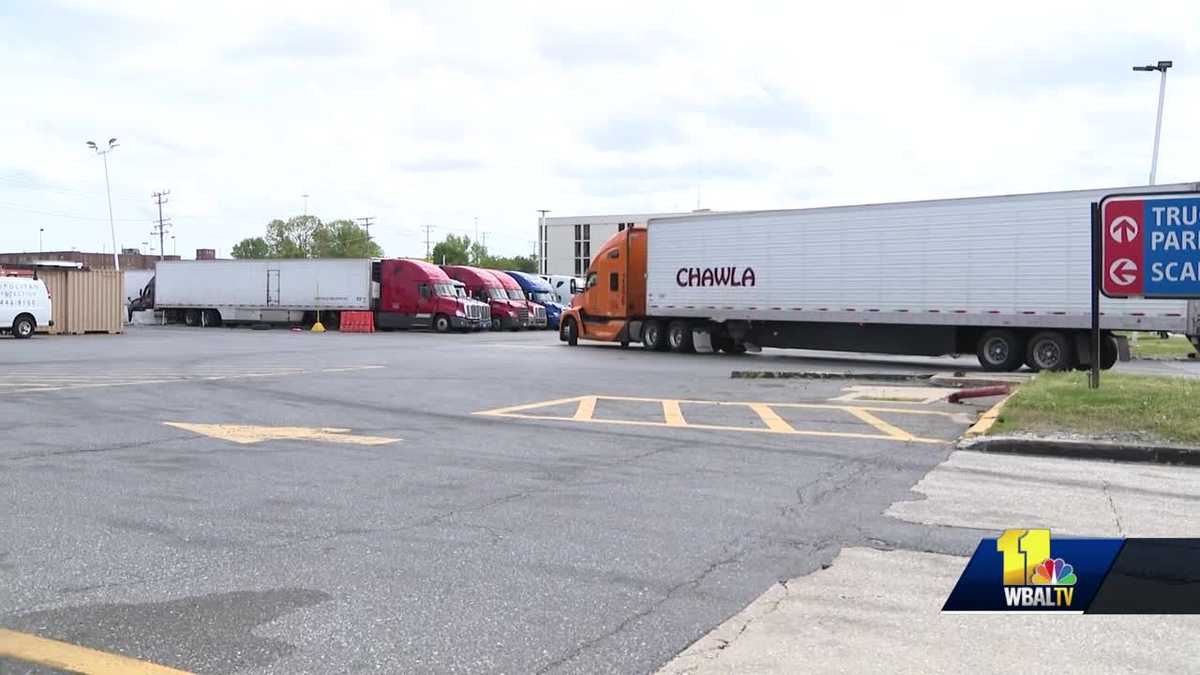THE CHALLENGING PART IS THAT WE SEE A LOT OF SHIFTING OF THE POLICY. DARIUS IRANI SAYS IT’S HARD TO TELL WHICH TARIFFS WILL BE IN EFFECT NEXT WEEK, MUCH LESS 90 DAYS FROM NOW. STILL, THE TOWSON UNIVERSITY CHIEF ECONOMIST FORESEES SOME TYPE OF SLOWDOWN AND SOON. IF THE HIGHER TARIFFS STICK AROUND, ALL THE TARIFFS AND THE IMPACT OF TARIFFS ARE DRIVEN BY THE HOUSEHOLD DECISION TO BUY GOODS AND GOODS. IF HOUSEHOLDS STOP BUYING THESE GOODS, IT MEANS THAT BASICALLY TRUCKERS WHO DELIVER THE GOODS WILL THEY’LL BE LESS OF A DEMAND FOR THEM, SO THEY’LL BE FEWER TRUCKERS NEEDED. AND THAT’S REALLY WHAT’S DRIVING SOME OF THIS. TRUCK DRIVERS AT THE STOP AND JESSUP FRIDAY SHARE MIXED REACTION. IT GOT WORSE OVER THE LAST. REAL RUSH OVER THE LAST FEW MONTHS. HOPEFULLY THE FUEL PRICES CAN STAY DOWN A LITTLE BIT. RIGHT NOW WE ARE LOOKING AT SOME CHANGE. SOMETHING IS CHANGING. MAYBE IT WILL BE GOOD FOR US DRIVERS. IRANI SAYS IF THE VOLUME OF CARGO AT THE PORT OF BALTIMORE DOES GO DOWN, IT WOULD MEAN LESS OF A NEED FOR SHORT AND LONG HAUL TRUCK DRIVERS, AND AT THE SAME TIME, IT COULD COST MORE JUST TO MAINTAIN THEIR ACTUAL TRUCKS. THERE’S A POSSIBILITY THAT PART MIGHT BE MANUFACTURED OVERSEAS AND THEN IMPORTED INTO THE US, AND THEN APPLIED TO THE TO THE TRUCK, SO IT MAY BE MORE COSTLY TO RUN THOSE DIESEL TRUCKS. THE ENTIRE SUPPLY CHAIN WILL FEEL THE IMPACT. TRUCK DRIVER OF MORE THAN 50 YEARS. SHEILA DIXON SAYS IT’S ALREADY BEING FELT. YOU CAN’T AFFORD TO BUY ANYTHING FOR THE TRUCK. TIRES. $400, $500. ALL THE SKY HIGH.
Truck drivers share mixed reactions on impact of Trump administration tariffs have on business
Truckers who haul loads of all sizes may soon have to hit the brakes if the Trump administration’s high tariffs stay in place.The ripple effect starts with the consumer, according to economists.”The challenging part is that we see a lot of shifting of the policy,” Towson University Regional Economic Studies Institute chief economist Daraius Irani said.Irani said it’s hard to tell which tariffs will be in effect next week, much less 90 days from now. Still, Irani foresees some type of slowdown, and it could be soon if the higher tariffs stick around.”All the tariffs and the impact of tariffs are driven by the household decision to buy goods. If households stop buying these goods, it means that, basically, truckers who deliver the goods, there will be less of a demand for them. There will be fewer truckers needed. That’s really what’s driving some of this,” Irani said.Truck drivers at a stop in Jessup shared mixed reactions on Friday.”It’s gotten worse, real worse over the last few months,” truck driver Huler Dixon said.”Hopefully, the fuel price can stay down a bit,” truck driver Nyron said.”Right now, we are looking at some change. Something is changing. Maybe it’ll be good for us drivers,” truck driver Jordy Camelo said.If the volume of cargo at the Port of Baltimore decreases, the need for short- and long-haul drivers would diminish, Irani said. At the same time, it could cost drivers more just to maintain the actual truck.”There’s a possibility that parts may be manufactured overseas and then imported into the U.S. and then applied to the truck, so it may be more costly to run those diesel trucks,” Irani said.The entire supply chain will feel the impact. Dixon, a truck driver for more than 50 years, said it’s already being felt.”You can’t afford to buy anything for the truck. Tires are $400, $500. Oil is sky high,” Dixon said.
Truckers who haul loads of all sizes may soon have to hit the brakes if the Trump administration’s high tariffs stay in place.
The ripple effect starts with the consumer, according to economists.
“The challenging part is that we see a lot of shifting of the policy,” Towson University Regional Economic Studies Institute chief economist Daraius Irani said.
Irani said it’s hard to tell which tariffs will be in effect next week, much less 90 days from now. Still, Irani foresees some type of slowdown, and it could be soon if the higher tariffs stick around.
“All the tariffs and the impact of tariffs are driven by the household decision to buy goods. If households stop buying these goods, it means that, basically, truckers who deliver the goods, there will be less of a demand for them. There will be fewer truckers needed. That’s really what’s driving some of this,” Irani said.
Truck drivers at a stop in Jessup shared mixed reactions on Friday.
“It’s gotten worse, real worse over the last few months,” truck driver Huler Dixon said.
“Hopefully, the fuel price can stay down a bit,” truck driver Nyron said.
“Right now, we are looking at some change. Something is changing. Maybe it’ll be good for us drivers,” truck driver Jordy Camelo said.
If the volume of cargo at the Port of Baltimore decreases, the need for short- and long-haul drivers would diminish, Irani said. At the same time, it could cost drivers more just to maintain the actual truck.
“There’s a possibility that parts may be manufactured overseas and then imported into the U.S. and then applied to the truck, so it may be more costly to run those diesel trucks,” Irani said.
The entire supply chain will feel the impact. Dixon, a truck driver for more than 50 years, said it’s already being felt.
“You can’t afford to buy anything for the truck. Tires are $400, $500. Oil is sky high,” Dixon said.

